Indigo Color – 52 Shades, Color Meaning, Mixing Guide and More
The indigo color seems to be a bit of a confusing color, as many people have different views as to what color indigo is. To try and clear things up a bit, we are going through our curated 52 shades of indigo, go into the various indigo color meanings, the history, uses in fashion and interior design and much more.
What Color Is Indigo?
An indigo color can be described as a color that sits between purple and blue when we look at a color wheel. So, is indigo blue or purple? Considering where it is located and the various shades and tints you can find; you can say it is a little bit of both these colors. What colors make indigo? The color can be created by mixing blue and red, however, much debate over whether it is a blue indigo color, or is it more purple?
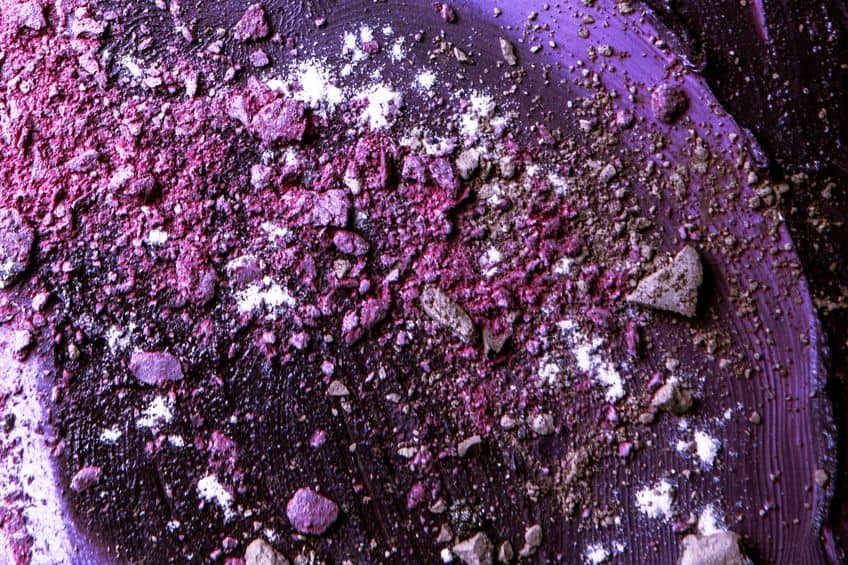
Even though you can get a variety of shades of indigo, in general, you can describe the color as mainly blue, but with violet undertones or a deep vibrant reddish-blue. Since many of us perceive color differently, indigo is one of those colors that is difficult to define precisely.
When searching for colors online, you will want the hex code to identify them. The hex code for indigo is #4b0082.
The table below shows you what it looks likes, along with other color codes if you wish to use the color in web design or for printing. This color might also differ from that of pigments you use to paint with. As you can see with the RGB or red, green, and blue color code, you will see that the amount of blue is a lot more, when compared to the red.
| Indigo Shade | Indigo Hex Code | CMYK Indigo Color Code (%) | RGB Indigo Color Code | Indigo Color |
| Indigo | #4b0082 | 42, 100, 0, 49 | 75, 0, 130 |
Indigo Color Meaning
Indigo, a deep color that sits between blue and violet on the spectrum, is often associated with intuition and perception. It’s a color that invokes a sense of deep calm and clarity, reminiscent of the twilight sky. As a color expert, I see indigo as representing wisdom, honesty, and authority.
It’s a color that encourages deep thinking and introspection, often linked to spirituality and enlightenment. In design, indigo can convey a sense of trustworthiness and stability, making it a preferred color for brands that wish to project these qualities.
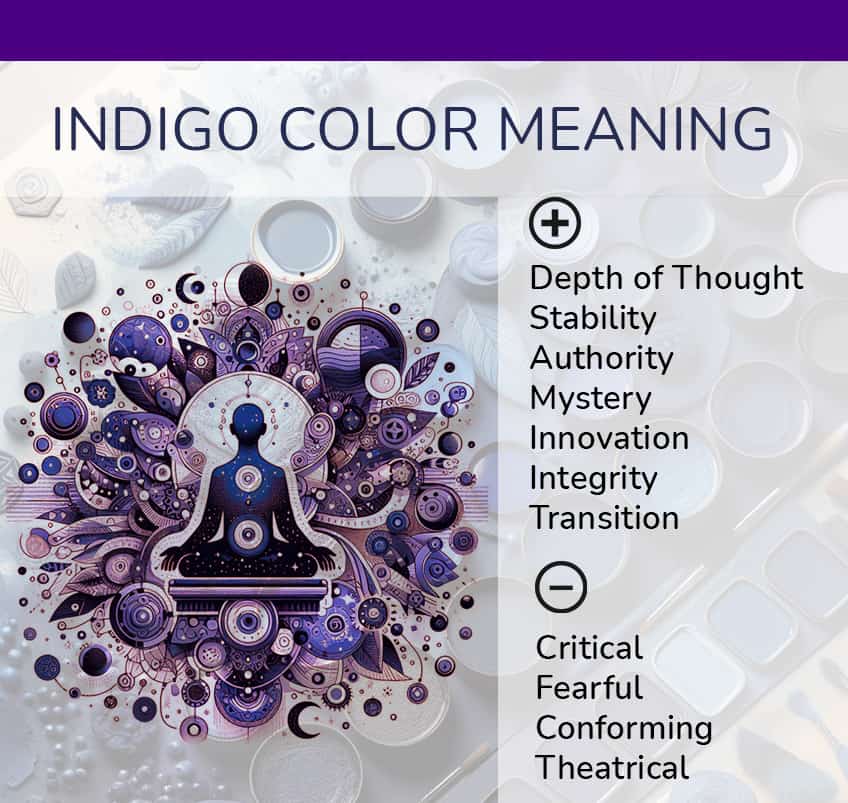
Its richness also adds a layer of luxury and sophistication, which can elevate the aesthetic of a product or space. Indigo’s powerful associations make it a dynamic and impactful color in various applications, from art to fashion to interior design.
| Category | Indigo Color Associations |
|---|---|
| Symbols | Depth of Thought, Stability, Authority, Mystery, Innovation, Integrity, Transition |
| Effects | Promotes Contemplation, Encourages Serenity, Enhances Concentration, Inspires Profoundness |
| Positive | Wisdom, Trustworthiness, Spiritual Awareness, Intellectual Depth |
| Negative | Overbearing if Overused, Perceived as Too Serious, Can Evoke Sadness in Excess |
Shades of Indigo
The indigo color is a difficult color to pinpoint, and many have different ideas of what the color should look like. There are also differences in the various types of indigo color, for example, the indigo dye color is different from the pigment and the indigo found in the color spectrum. Below are some of the shades of indigo.
Aesthetic Indigo
Aesthetic Indigo is a dark, muted blue-purple, sophisticated and artistic. It’s great for spaces that emphasize creativity and design, such as art studios or modern galleries.
| Hex: #36285B RGB: 54, 40, 91 CMYK: 41, 56, 0, 64 |
Blue-Violet
Blue-Violet is a vibrant color that blends the calmness of blue with the mystique of violet. It’s ideal for accent pieces that combine serenity with a hint of creativity.
| Hex: #8A2BE2 RGB: 138, 43, 226 CMYK: 39, 81, 0, 11 |
Bright Indigo
Bright Indigo is a luminous, vivid shade that adds an electric pop to any design. It’s great for modern, high-energy environments or digital interfaces.
| Hex: #6f00fe RGB: 111, 0, 254 CMYK: 56, 100, 0, 0 |
Dark Indigo
Dark Indigo is a very deep blue that is almost black, evoking the feel of the deep ocean. It’s suited for elegant attire or as a grounding color in art.
| Hex: #1F0954 RGB: 31, 9, 84 CMYK: 63, 89, 0, 67 |
Deep Indigo
Deep Indigo is a saturated, dark blue-purple that suggests sophistication. Perfect for a statement wall or luxury items where depth and intensity are desired.
| Hex: #2b0071 RGB: 43, 0, 113 CMYK: 62, 100, 0, 56 |
Electric Indigo
Electric Indigo is a bright and intense version of indigo, almost neon. It’s excellent for vibrant designs that demand attention and can energize a space.
| Hex: #6F00FF RGB: 111, 0, 255 CMYK: 56, 100, 0, 0 |
Faded Indigo
Faded Indigo is a light, washed-out blue that has a gentle, nostalgic feel. It’s ideal for shabby chic decor or vintage fashion, bringing a sense of history and charm.
| Hex: #BFD2E0 RGB: 191, 210, 224 CMYK: 15, 6, 0, 12 |
Happy Indigo
Happy Indigo is a bright, cheerful shade of indigo, full of energy and positivity. It’s great for spaces that aim to be vibrant and lively, such as children’s rooms or creative studios.
| Hex: #726EFF RGB: 114, 110, 255 CMYK: 55, 57, 0, 0 |
Heather Indigo
Heather Indigo is a muted purple-grey, soft and unassuming. It’s excellent for textiles and works well in spaces designed for relaxation and contemplation.
| Hex: #2d2643 RGB: 45, 38, 67 CMYK: 33, 43, 0, 74 |
Imperial Blue
Imperial Blue is a deep, royal blue that conveys a regal and authoritative presence. It’s suitable for formal spaces or as a commanding accent in design.
| Hex: #002395 RGB: 0, 35, 149 CMYK: 100, 77, 0, 42 |
Indigo
Indigo is a deep, rich color between blue and violet. Reminiscent of the night sky, it’s perfect for creating a sense of depth and mystery in a space. Tip: Use in a reading nook to encourage introspection and imagination.
| Hex: #4B0082 RGB: 75, 0, 130 CMYK: 42, 100, 0, 49 |
Indigo (Pantone)
Indigo (Pantone) is a deep, muted purple-blue, reflecting the standardized color for consistent use in design and fashion. It’s perfect for branding or where color accuracy is crucial.
| Hex: #4C3957 RGB: 76, 57, 87 CMYK: 13, 34, 0, 66 |
Indigo (web safe color)
This Indigo is a bold, saturated blue designed to be vibrant and consistent across digital platforms. It’s perfect for web design where strong, consistent color is key.
| Hex: #330099 RGB: 51, 0, 153 CMYK: 67, 100, 0, 40 |
Indigo Blue
Indigo Blue is a deep blue with a violet undertone, rich and commanding. It’s excellent for adding a striking touch to branding or as an accent in corporate designs.
| Hex: #3F0FB7 RGB: 63, 15, 183 CMYK: 66, 92, 0, 28 |
Indigo Bunting
Indigo Bunting is a vibrant, bird-inspired blue, bright and lively. It’s great for adding a touch of natural beauty to outdoor spaces or as an accent in wildlife-themed rooms.
| Hex: #006CA9 RGB: 0, 108, 169 CMYK: 100, 36, 0, 34 |
Indigo Carmine
Indigo Carmine is a deep, vivid blue, resembling the dye of the same name. It’s perfect for bold, statement-making designs, particularly in fashion or graphic arts.
| Hex: #1A3338 RGB: 26, 51, 56 CMYK: 54, 9, 0, 78 |
Indigo Denim
Indigo Denim is a classic, deep blue associated with denim fabric. It’s versatile and timeless, perfect for casual wear or bringing a relaxed vibe to interior decor.
| Hex: #2F314E RGB: 47, 49, 78 CMYK: 40, 37, 0, 69 |
Indigo Dusk
Indigo Dusk is a muted blue-purple that captures the peaceful transition from day to night. It’s perfect for a serene living space or bedroom that aims for a restful ambiance.
| Hex: #4A4067 RGB: 74, 64, 103 CMYK: 28, 38, 0, 60 |
Indigo Dye
Indigo Dye is a traditional color that resembles natural indigo dye. It’s perfect for creating an authentic, artisanal feel in textiles or rustic interiors.
| Hex: #00416A RGB: 0, 65, 106 CMYK: 100, 39, 0, 58 |
Indigo Gray
Indigo Gray is a muted blend of indigo and gray, offering a sophisticated and modern hue. Ideal for contemporary spaces, it pairs well with metallic accents for an urban-chic look.
| Hex: #CDC9D4 RGB: 205, 201, 212 CMYK: 3, 5, 0, 17 |
Indigo Mist
Indigo Mist is a soft, ethereal blend of indigo with a hint of gray, reminiscent of a misty morning sky. It’s great for creating a tranquil, dreamy atmosphere in bedrooms or quiet areas.
| Hex: #ece4f1 RGB: 236, 228, 241 CMYK: 2, 5, 0, 5 |
Indigo Purple
Indigo Purple is a deep, rich blend of purple and indigo, perfect for adding a touch of mystery and luxury to any setting. It works well in creative spaces or as an elegant accent in fashion.
| Hex: #2C106A RGB: 44, 16, 106 CMYK: 58, 85, 0, 58 |
Indigo Red
Indigo Red is a unique blend of indigo with red tones, offering a warm and inviting hue. It’s perfect for cozy, intimate interiors or for adding a warm accent to cool-colored designs.
| Hex: #695A78 RGB: 105, 90, 120 CMYK: 13, 25, 0, 53 |
Indigo White
Indigo White is a very pale blue that has just a whisper of indigo. It’s great for creating a crisp, clean look with a hint of color.
| Hex: #ebf6f7 RGB: 235, 246, 247 CMYK: 5, 0, 0, 3 |
Japanese Indigo
Japanese Indigo, inspired by traditional Japanese dyes, is a muted, dark blue with a touch of green. It’s perfect for creating a serene, Zen-like atmosphere in spaces aiming for natural and harmonious aesthetics.
| Hex: #264348 RGB: 38, 67, 72 CMYK: 47, 7, 0, 72 |
Kachi Indigo
Kachi Indigo is a dark, muted blue with a hint of gray, evoking the traditional Japanese indigo dye. It’s ideal for adding depth and cultural richness to designs and textiles.
| Hex: #393e4f RGB: 57, 62, 79 CMYK: 28, 22, 0, 69 |
Lavender Indigo
Lavender Indigo is a soft purple with an indigo undertone, blending the calmness of lavender with the depth of indigo. It’s perfect for a serene yet colorful touch in home decor or apparel.
| Hex: #9457eb RGB: 148, 87, 235 CMYK: 37, 63, 0, 8 |
Light Indigo
Light Indigo is a pale, washed-out indigo, offering a subtle hint of color. It’s excellent for creating a light, airy feel in spaces, especially when paired with crisp whites.
| Hex: #6D5ACF RGB: 109, 90, 207 CMYK: 47, 57, 0, 19 |
Midnight Indigo
Midnight Indigo is a dark, inky blue that captures the essence of a midnight sky. It’s ideal for creating a dramatic and intimate atmosphere in a space.
| Hex: #0e1b40 RGB: 14, 27, 64 CMYK: 78, 58, 0, 75 |
Muted Indigo
Muted Indigo is a soft, understated blue-purple, ideal for creating a subtle yet colorful ambiance. It works well in relaxing spaces like bedrooms or lounges where a touch of color is desired without overwhelming.
| Hex: #4C367E RGB: 76, 54, 126 CMYK: 40, 57, 0, 51 |
Mystic Indigo
Mystic Indigo is a deep, mysterious blue with a touch of purple, perfect for creating an enchanting and mystical ambiance in a space.
| Hex: #4A128E RGB: 74, 18, 142 CMYK: 48, 87, 0, 44 |
Navy Indigo
Navy Indigo is a dark, almost black shade of indigo, embodying sophistication and depth. It’s a great alternative to black in formal wear or for a dramatic touch in interior design.
| Hex: #4C5E87 RGB: 76, 94, 135 CMYK: 44, 30, 0, 47 |
Neon Indigo
Neon Indigo is a fluorescent blue with a vibrant, glowing effect. It’s perfect for futuristic or neon-themed designs and can add a dynamic touch to nightlife or entertainment spaces.
| Hex: #7B00FF RGB: 123, 0, 255 CMYK: 52, 100, 0, 0 |
Nightshade Indigo
Nightshade Indigo is a dark, moody blue with a hint of purple, reminiscent of the nightshade plant. It’s ideal for creating a dark, intimate setting or for sophisticated evening wear.
| Hex: #4f4352 RGB: 79, 67, 82 CMYK: 4, 18, 0, 68 |
Ocean Indigo
Ocean Indigo is a deep blue with green undertones, capturing the essence of the deep ocean. It’s perfect for spaces that aim to evoke the vastness and mystery of the sea.
| Hex: #485479 RGB: 72, 84, 121 CMYK: 40, 31, 0, 53 |
Orchid
Orchid is a bright, floral purple, evoking the exotic beauty of its namesake flower. It’s great for adding a vibrant, feminine touch to interiors or as a lively accent in fashion.
| Hex: #da70d6 RGB: 218, 112, 214 CMYK: 0, 49, 2, 15 |
Pale Indigo
Pale Indigo is a light, desaturated indigo, subtle and soothing. It’s suitable for creating a soft, calming effect in spaces like nurseries or light-filled sunrooms.
| Hex: #9892B1 RGB: 152, 146, 177 CMYK: 14, 18, 0, 31 |
Pastel Indigo
Pastel Indigo is a soft, light blue with a hint of indigo, gentle and dreamy. It’s ideal for creating a soothing, airy feel in spaces like nurseries or light-filled living areas.
| Hex: #8686AF RGB: 134, 134, 175 CMYK: 23, 23, 0, 31 |
Persian Indigo
Persian Indigo is a deep, intense purple, rich and exotic. It’s excellent for adding a luxurious and regal touch to interiors, textiles, or fashion.
| Hex: #32127A RGB: 50, 18, 122 CMYK: 59, 85, 0, 52 |
Royal Indigo
Royal Indigo is a deep, saturated blue-purple that exudes luxury and depth. It’s perfect for an elegant backdrop or sophisticated apparel.
| Hex: #240952 RGB: 36, 9, 82 CMYK: 56, 89, 0, 68 |
Slate Indigo
Slate Indigo is a muted blue-grey, sophisticated and modern. It’s perfect for urban-inspired designs, contemporary fashion, and modern home decor.
| Hex: #4E6172 RGB: 78, 97, 114 CMYK: 32, 15, 0, 55 |
Smoky Indigo
Smoky Indigo is a deep, dusky blue with a smoky quality, perfect for creating a mysterious and sophisticated atmosphere. It works well in spaces designed for relaxation or contemplation.
| Hex: #38417E RGB: 56, 65, 126 CMYK: 56, 48, 0, 51 |
Starry Indigo
Starry Indigo is a deep, dark blue that evokes the night sky filled with stars. It’s ideal for creating a sense of wonder and infinity in a space, especially in astronomical or space-themed rooms.
| Hex: #32127A RGB: 50, 18, 122 CMYK: 59, 85, 0, 52 |
Steel Indigo
Steel Indigo is a cool, metallic blue with a hint of indigo, modern and sleek. It’s perfect for industrial-inspired designs or as a contemporary accent in home decor.
| Hex: #35586C RGB: 53, 88, 108 CMYK: 51, 19, 0, 58 |
Stormy Indigo
Stormy Indigo is a dark, brooding blue with gray undertones, capturing the essence of a stormy sea. It’s great for dramatic and moody interiors or for adding depth to a color palette.
| Hex: #484D6D RGB: 72, 77, 109 CMYK: 34, 29, 0, 57 |
Supreme Indigo
Supreme Indigo is a rich, deep blue with a regal presence, blending the depth of indigo with a sense of luxury. Ideal for formal settings or as an accent in high-end fashion and design.
| Hex: #382080 RGB: 56, 32, 128 CMYK: 56, 75, 0, 50 |
Tropical Indigo
Tropical Indigo is a lighter, softer blue with a touch of purple, evocative of tropical twilight. It’s suitable for vacation-inspired apparel or breezy, beachfront interiors.
| Hex: #9683EC RGB: 150, 131, 236 CMYK: 36, 44, 0, 7 |
Twilight Indigo
Twilight Indigo is a dark blue-grey that mimics the subtle hues of the evening sky. It’s great for creating a tranquil, sophisticated setting in both modern and classic interiors.
| Hex: #131925 RGB: 19, 25, 37 CMYK: 49, 32, 0, 85 |
Vintage Indigo
Vintage Indigo is a washed-out, aged blue, evocative of worn denim or antique fabrics. It’s excellent for vintage fashion or in rustic interior settings where a touch of nostalgia is desired.
| Hex: #4A556B RGB: 74, 85, 107 CMYK: 31, 21, 0, 58 |
Violet Indigo
Violet Indigo is a deep, purplish-blue that offers a blend of the calm of blue with the intrigue of violet. It’s well-suited for design elements that seek a balance of warmth and coolness.
| Hex: #3e285c RGB: 62, 40, 92 CMYK: 33, 57, 0, 64 |
Vivid Indigo
Vivid Indigo is a striking, bright blue-purple that exudes energy and vibrancy. It’s perfect for eye-catching designs, digital art, or as a statement color in modern interiors. Tip: Use in small doses to add a dynamic touch to a space.
| Hex: #6F00EE RGB: 111, 0, 238 CMYK: 53, 100, 0, 7 |
Indigo Color: A Brief History
Indigo’s origins are rich and multifaceted, with its roots deeply entrenched in both history and science. Historically, the indigo dye was derived from the plant Indigofera Tinctoria, known as true indigo, and was first imported to Europe from India, hence its name from the Latin ‘indicum,’ meaning Indian. The dye, which is closer to blue than purple, has been used since ancient times, with evidence of its use dating back to 4000 BC in Peru.
Throughout history, indigo has been highly valued, becoming a rare and sought-after commodity in Europe by the 17th century, traveling along the Silk Road. Its cultivation spread across various regions, including Asia and the Americas, where it played a significant role in the economy, such as funding the American Revolutionary War, before being replaced by synthetic dyes.
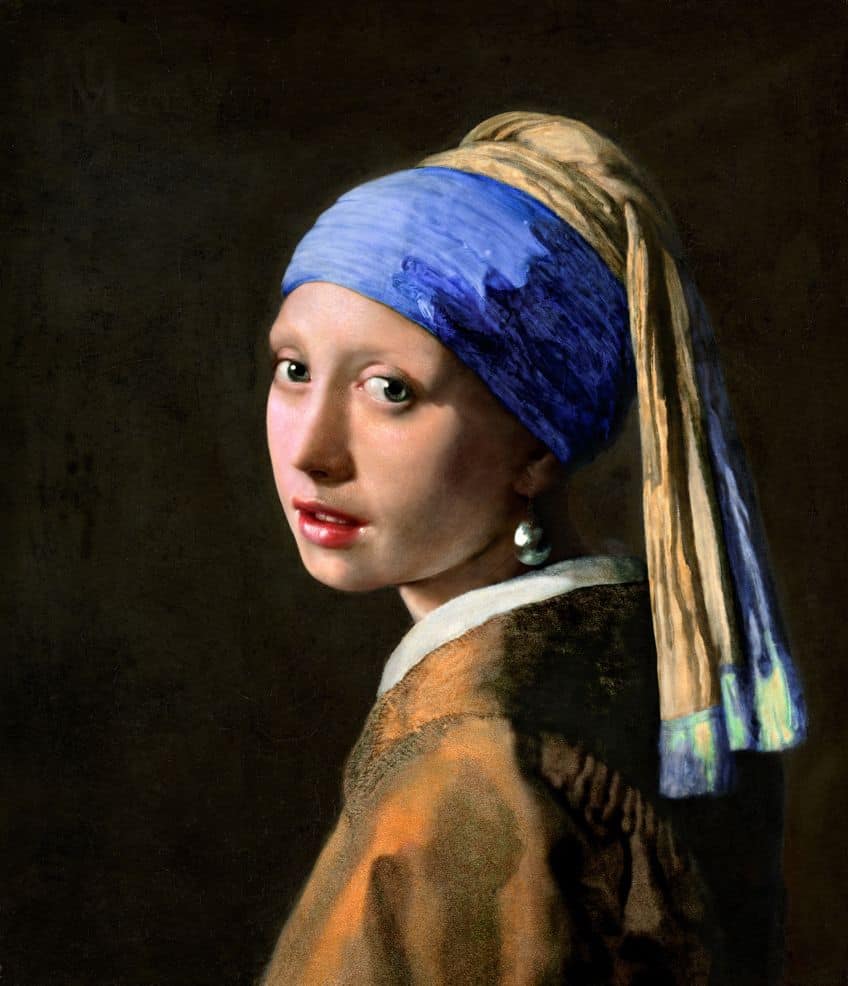
From a scientific perspective, indigo is recognized as one of the colors of the visible spectrum, situated between blue and violet. Its inclusion as one of the seven rainbow colors is credited to Isaac Newton, who identified the color spectrum. However, the necessity of indigo as a distinct color in the spectrum has been debated, with some suggesting that it be removed due to its close resemblance to blue and violet.
Despite this, indigo has made a lasting impact in the art world, used by renowned artists like Sir Peter Paul Rubens and Johannes Vermeer to create depth and intensity in their works. Today, while most indigo dye is synthetic, its legacy continues, notably in the ubiquitous denim jeans pioneered by Levi Strauss, and in various art mediums where it remains a celebrated color.
Creating Indigo Paint Colors
A major use for indigo colors in paintings is to create landscapes and night skies. If you want to use an indigo color when painting, it might be best for you to purchase a tube of indigo color paint. The pigment color is quite popular, easily obtained, and affordable. Most of these paints are made from around three parts blue and one part purple.
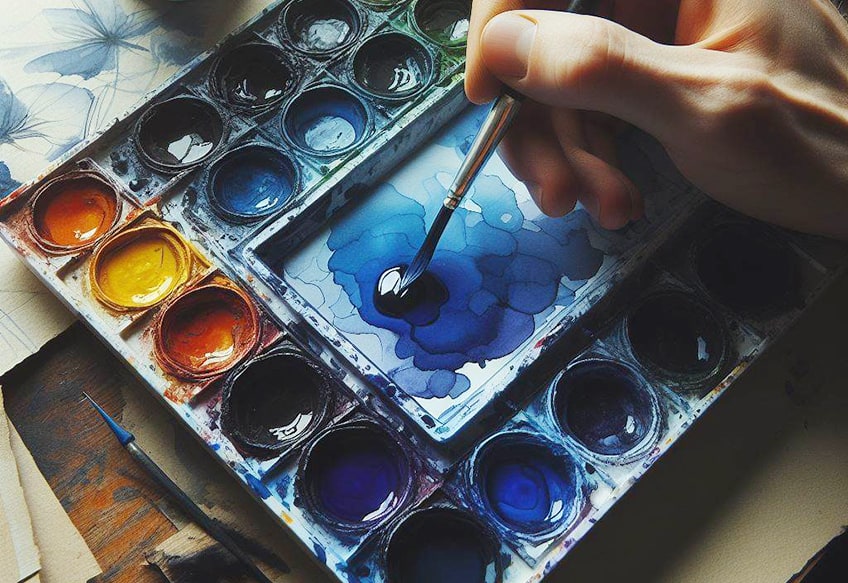
You can create your own indigo color by blending the following paints in the same ratio.
- Darker blues are not the best option for creating indigo; rather use something like a cobalt blue.
- When it comes to purple, you can consider dioxazine purple or violet paint, which might work even better.
Create a color palette when blending indigo so that you can test it out and make a reference chart for future use. Combine three parts blue with one part purple and then you can experiment from there. If you think you have added too much purple, and the color becomes too dark, try to add in more blue to lighten it instead of adding in white.
Indigo Shades in Fashion
Indigo, with its deep and enigmatic hue, has long been a staple in the fashion industry, particularly revered for its role in creating the classic denim jean. This versatile color exudes a sense of sophistication and can range from the darkest shades, reminiscent of the night sky, to more vibrant, electric variations.
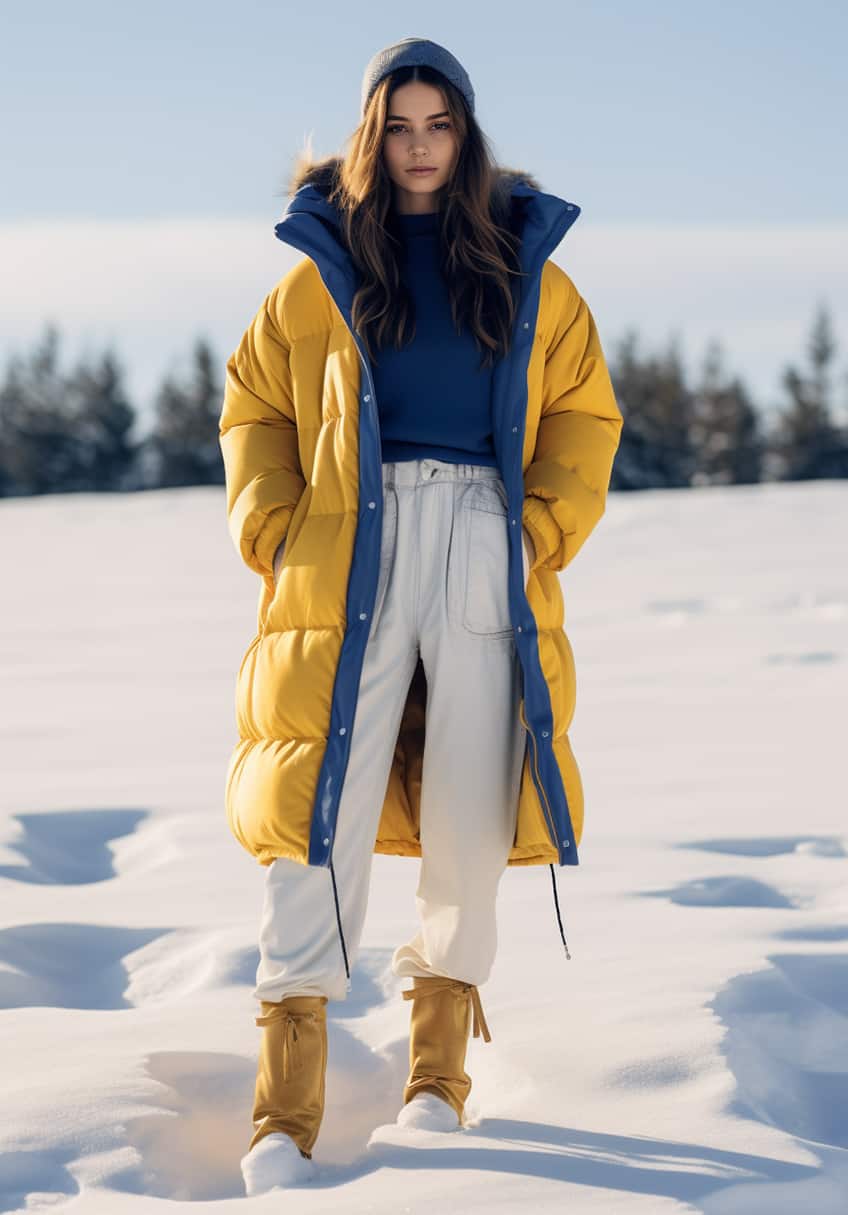
In fashion, indigo serves as a robust neutral, pairing effortlessly with a spectrum of colors, from crisp whites to warm earth tones, and even bold neons for a contemporary twist. It’s a color that can carry an outfit from season to season, offering a timeless quality that is both elegant and effortlessly cool.
Whether it’s the main feature of a garment or a subtle detail, indigo’s rich saturation and durability make it a perennial favorite in wardrobes around the world.
Interior Design With Indigo
Indigo is a color that can be used to great effect in all areas of design, but especially in fashion and interior design. Indigo is a classic color that lasts through all kinds of trends, and it can be combined with many other colors to make create some interesting interior designs. The indigo color can be used in most rooms, including the bedroom, living areas, and even the kitchen.
To create the best classic look, indigo will always work well with white and beige.
The color can be used as the main theme of a room and all the walls if you are looking for something bolder. Just remember to balance it out with other colors that work well with indigo, so it does not appear too heavy and overwhelming. Otherwise, adding in indigo accents can be a way of bringing in the color, without it becoming too much. This can be done by creating an accent wall and using accessories like throws and cushions to bring color into a room. There are all kinds of other indigo accessories you can bring into a room.
- Patterned rugs
- Vases
- Paintings
- Candles
- Lamps
You could also decide on indigo furniture, think sofas, single-seated armchairs, and kitchen chairs. In the bedroom, the base of the bed could be indigo or use linens and fabrics to create a calm and welcoming space.
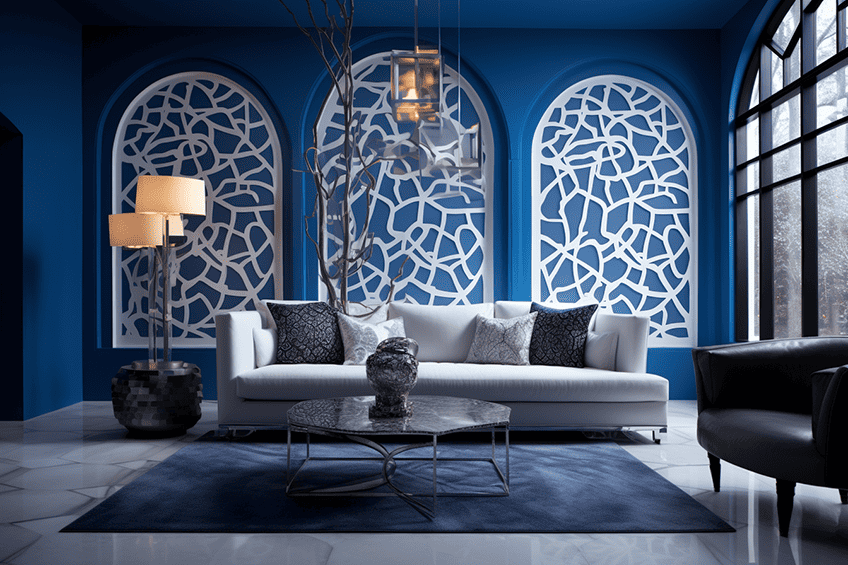
Add in a patterned comforter and other colors like white or for more color, consider yellow or orange accents. The color A dark, saturated blue indigo color is a good choice, as it has soothing properties. The color indigo can also make a beautiful and soothing bathroom design. Combine it with white as well as gold taps to add a bit of a luxury feel to the room
Indigo might be a difficult color to describe, but it certainly does have a place in our lives. A soothing color that is also associated with creativity and wisdom, and with all the different shades available, indigo can be the next color theme for your home or outfit.
Frequently Asked Questions
Is Indigo Blue or Purple?
Indigo can be described as a color that is situated between blue and purple on the color wheel. So, it can be seen as a blend of both colors. However, there are many shades of indigo and some are more of a blue indigo color, while others have more of a purple undertone.
What Color Is Indigo?
Let us first look at what colors make indigo. Since indigo is a combination of blue and purple, you can say that indigo is a blue with a violet or reddish undertone. However, it can range between being more purple or bluer, which is what makes it difficult to define.
How Can You Wear the Color Indigo?
Indigo is a color that does not attract attention and is the perfect everyday color to wear. Some of the best colors to wear with indigo include mustard, emerald-green, orange, gray, and mint. The color can be used with pants, jackets, dresses, skirts, shirts, and shoes.
In 2005, Charlene completed her Wellness Diplomas in Therapeutic Aromatherapy and Reflexology from the International School of Reflexology and Meridian Therapy. She worked for a company offering corporate wellness programs for a couple of years, before opening up her own therapy practice. It was in 2015 that a friend, who was a digital marketer, asked her to join her company as a content creator, and this is where she found her excitement for writing.
Since joining the content writing world, she has gained a lot of experience over the years writing on a diverse selection of topics, from beauty, health, wellness, travel, and more. Due to various circumstances, she had to close her therapy practice and is now a full-time freelance writer. Being a creative person, she could not pass up the opportunity to contribute to the Art in Context team, where is was in her element, writing about a variety of art and craft topics. Contributing articles for over three years now, her knowledge in this area has grown, and she has gotten to explore her creativity and improve her research and writing skills.
Charlene Lewis has been working for artincontext.org since the relaunch in 2020. She is an experienced writer and mainly focuses on the topics of color theory, painting and drawing.
Learn more about Charlene Lewis and the Art in Context Team.
Cite this Article
Charlene, Lewis, “Indigo Color – 52 Shades, Color Meaning, Mixing Guide and More.” Art in Context. June 28, 2022. URL: https://artincontext.org/indigo-color/
Lewis, C. (2022, 28 June). Indigo Color – 52 Shades, Color Meaning, Mixing Guide and More. Art in Context. https://artincontext.org/indigo-color/
Lewis, Charlene. “Indigo Color – 52 Shades, Color Meaning, Mixing Guide and More.” Art in Context, June 28, 2022. https://artincontext.org/indigo-color/.


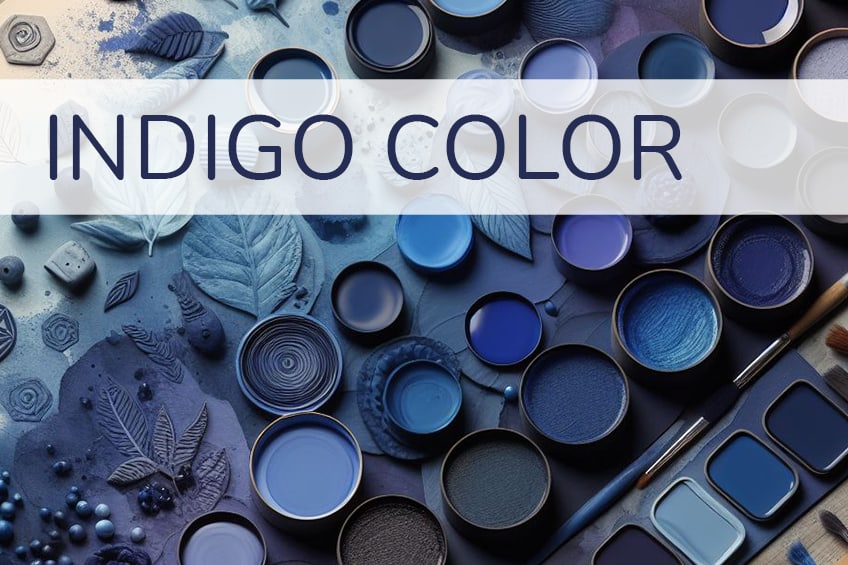

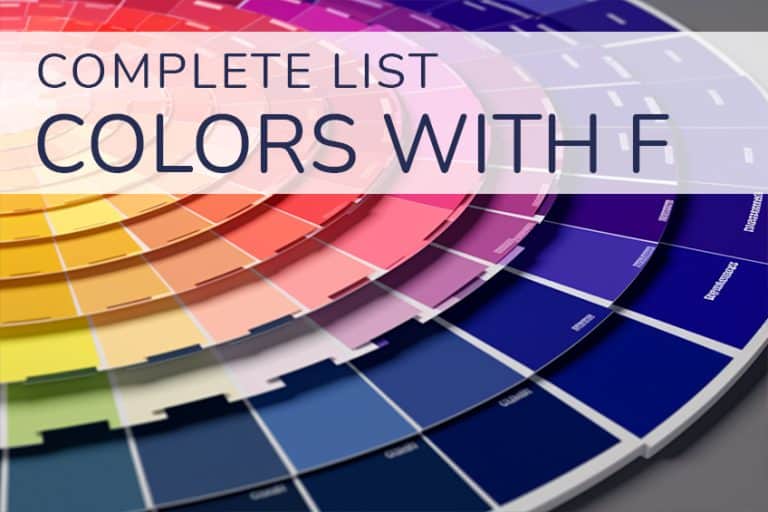
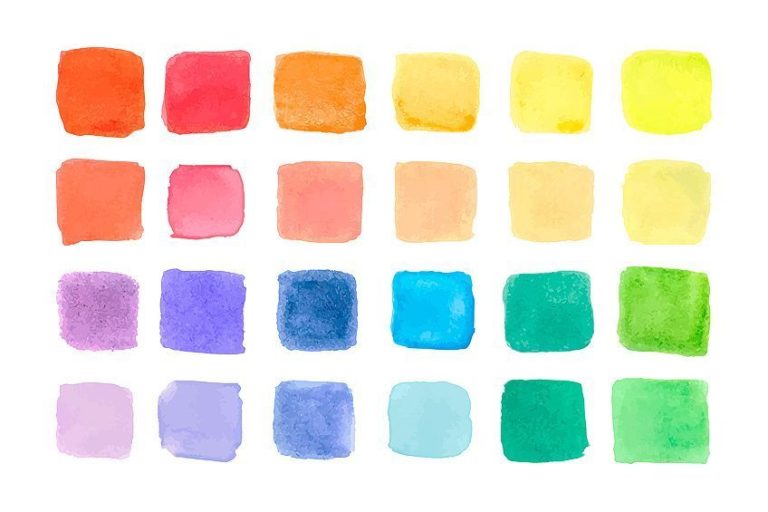

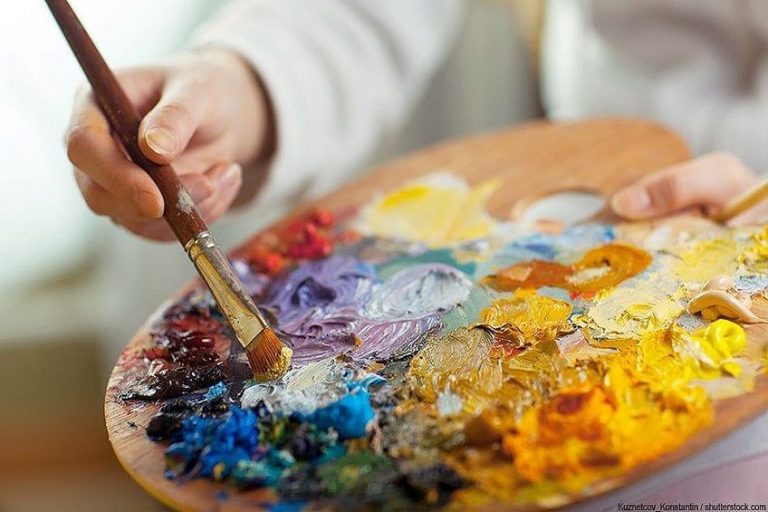
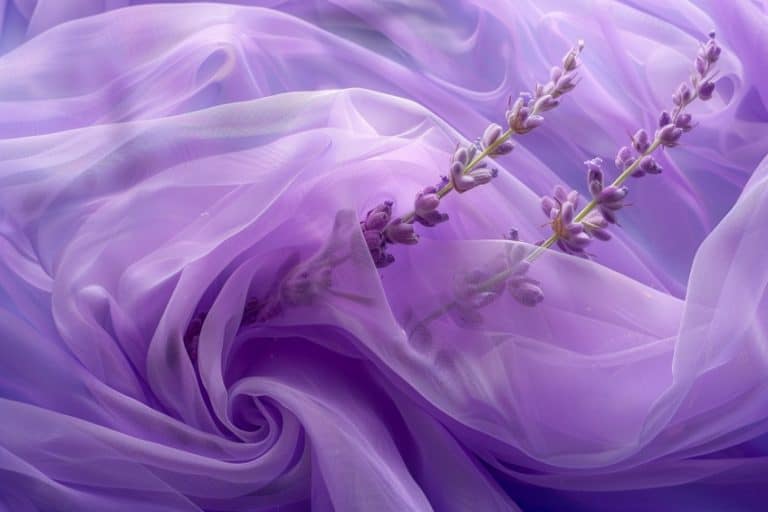
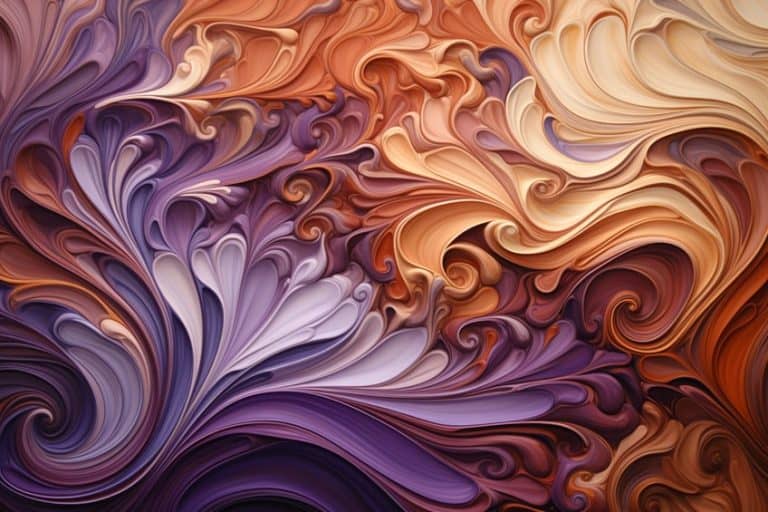
If only I could buy a tube of Persian Indigo paint instead of having to figure out how to mix colors. I want to paint my own planner cover and don’t exactly know how to go about it.